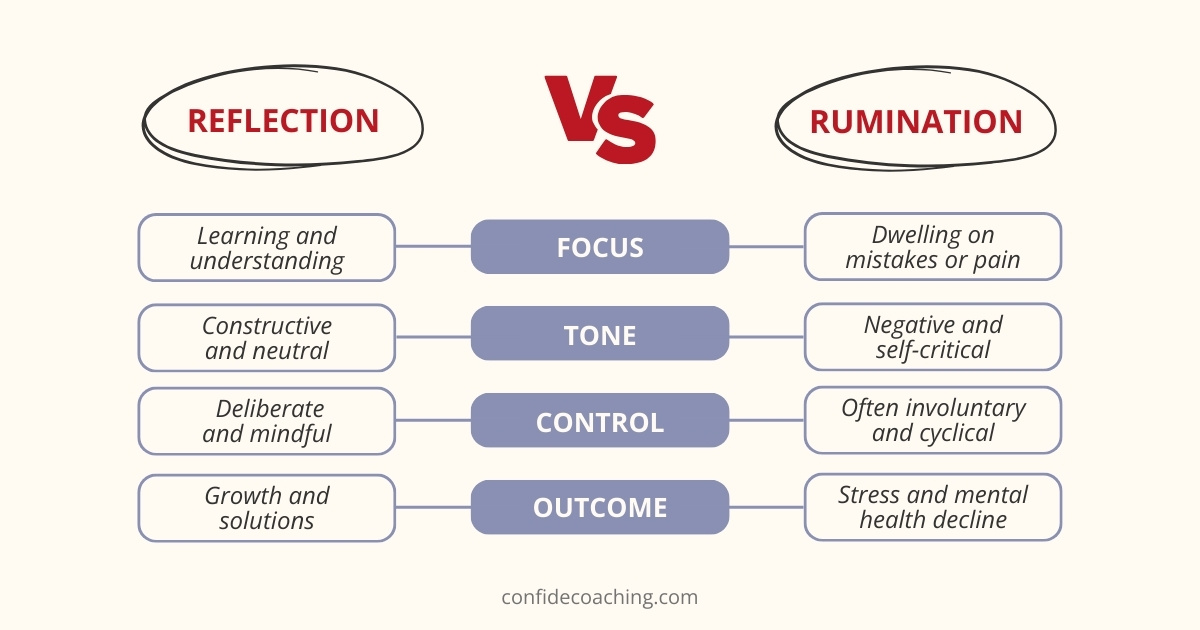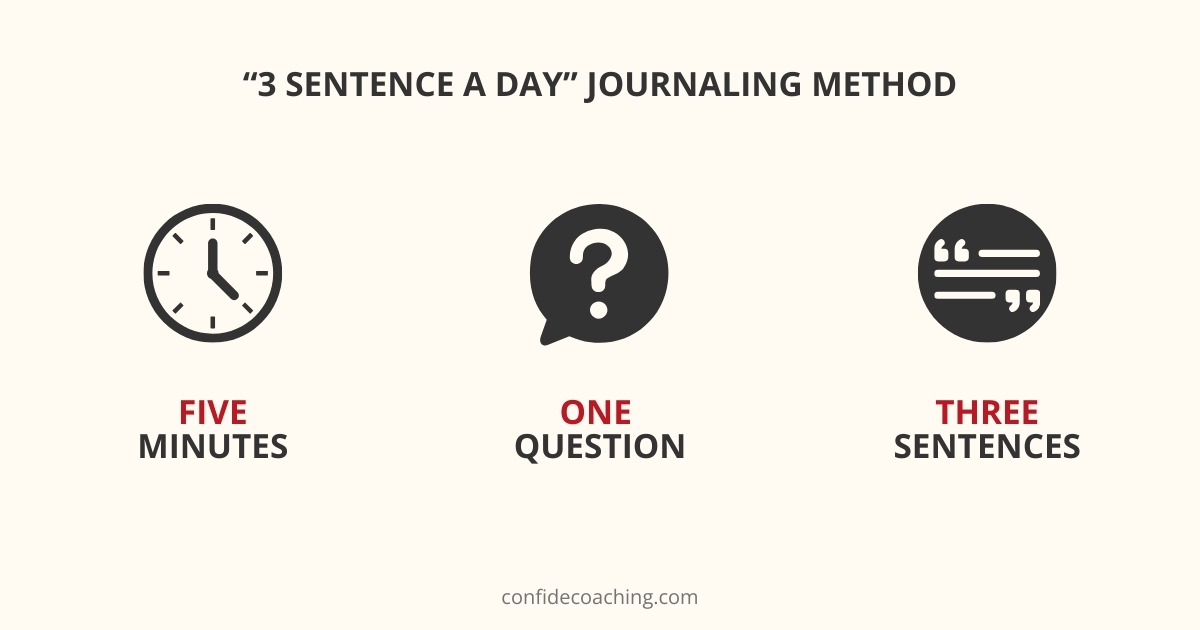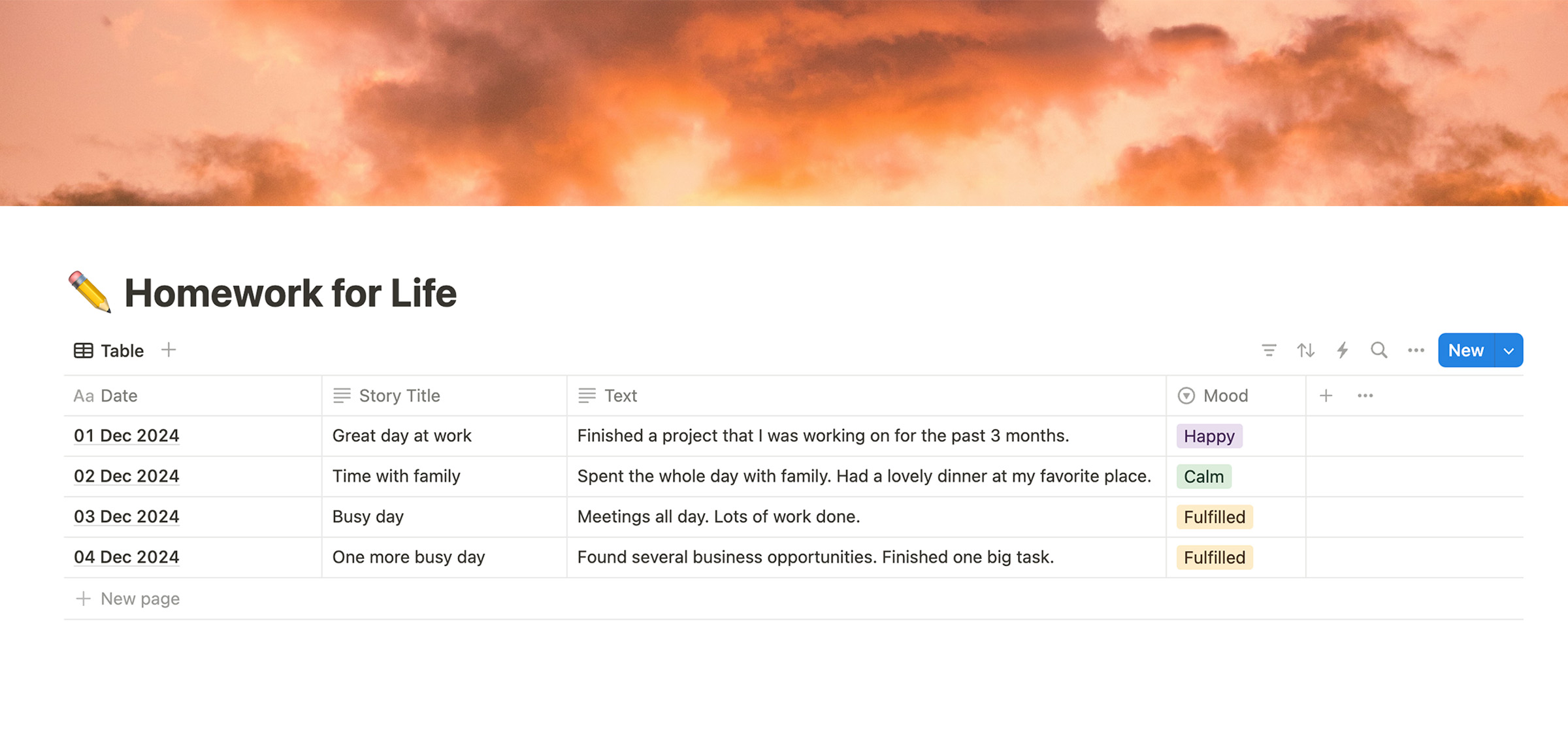
Many of you have probably heard about the great benefits of journaling. It’s been praised for boosting mindfulness, improving emotional resilience, and helping you gain clarity in your life. Maybe you’ve even read about it in this article on the benefits of journaling, and you’re convinced it’s a wonderful idea.
But the truth is that, for many, journaling can quickly turn into a daunting task. You want to give it a go, but the commitment feels too big. You’re not sure how to start, what to write about, or if you’re even “doing it right.” The blank page stares back at you, and the idea of journaling fades into the background, crowded out by the demands of daily life.
This is where the 3 Sentence a Day method comes in. Adapted from the “Homework for Life” practice in Matthew Dicks’ book Storyworthy, this method offers a simple, approachable way to reflect on your day and capture the moments that matter—no overthinking required. It’s not just about recording your day; it’s about training yourself to notice the meaningful threads woven into even the most ordinary experiences. A small act of kindness, a quiet moment of joy, or a challenge you overcame—these are the moments that, when noticed and honored, bring richness and depth to everyday life.
By focusing on just three sentences, you can create a journaling habit that fits into even the busiest schedules, while learning to appreciate the value hidden in the seemingly mundane. Over time, this practice helps you uncover the extraordinary in the ordinary and develop a deeper connection to your daily experiences.
In this article, I will teach you how to start using the 3 Sentence a Day method in your own life. You’ll learn how this simple practice can help you reflect on meaningful moments, build a sustainable journaling habit, and transform the way you see and engage with your everyday life.
Why Finding Meaning Matters
In the rush of daily life, it’s easy to let meaningful moments pass by unnoticed. We’re often so focused on our to-do lists and responsibilities that small, significant experiences—like a heartfelt conversation, a moment of laughter, or even a quiet moment of reflection—fade into the background. These moments might seem ordinary, but they’re the threads that give our lives richness and meaning.
If we don’t make time to notice these small moments, our senses start to numb, and life can begin to feel less vibrant and exciting. The beauty in our days becomes harder to see, and we risk losing touch with the experiences that make us feel truly alive.
Many people are drawn to traditional journaling as a tool to download their stress and anxiety, organize their thoughts, or reflect on solutions to problems. While journaling can be an excellent way to process emotions and gain clarity, the opposite sometimes happens: it turns into a rumination practice, a space to vent frustrations and reinforce negative ideas.

The 3 Sentence a Day method offers a refreshing alternative. By keeping it short and focused, this method removes the overwhelm of long entries and shifts the purpose of journaling toward finding meaning in your day. It encourages you to pause, take a breath, and notice the small, meaningful details in your life—it’s a reminder to slow down and smell the roses.
Whether it’s a joyful, challenging, or seemingly uneventful day, this approach helps you honor the moments that matter, reconnecting you to the richness of your everyday experiences. Instead of letting these moments slip by, you capture them, creating a practice that brings clarity and meaning into even the busiest or most stressful of days.
What Is the 3 Sentence a Day Method?
The 3 Sentence a Day method is a simple yet powerful way to capture the moments that bring meaning to your life. It’s designed to be quick, approachable, and sustainable—perfect for even the busiest schedules. Here’s how it works:
1. Dedicate 3-5 minutes at the end of your day. Find a quiet moment to pause and reflect.
2. Ask yourself one question: What moment stood out today? It doesn’t need to be big or life-changing—just something that resonated with you.
3. Write it down in three sentences or less. Focus on the essence of the moment and why it mattered.
Here are some examples from different areas of life:
- Today, I made my son laugh so hard at dinner that he spilled his water. The mess didn’t matter—his laughter made it all worth it.”
- “I had a difficult conversation at work today, but I stayed calm and clear without losing my cool. It wasn’t easy, but I’m proud of how I handled the situation.”
- “The evening sky was so beautiful it stopped me in my tracks. Taking a deep breath, I realized how often I get caught up in my thoughts and don’t notice moments like this.”
- “I received some tough health news today, and it was hard to process. I reminded myself to take it one step at a time and focus on what I can control. Even though it feels overwhelming, I know I have the strength to face this.”
- “My coworker surprised me with coffee, reminding me how thoughtful small gestures can be.”
- “I got a call today about a new opportunity I’ve been hoping for, and I can’t stop smiling. It feels exciting and a little scary, but I’m ready to embrace the challenge. This moment reminds me how rewarding it is to take risks and dream big.”
- “I chose to say no to something that didn’t feel right for me, and it felt empowering to honor my boundaries and stay true to my values.”
This practice works for all kinds of days. On good days, it highlights moments of joy and gratitude. On tough days, it helps you find meaning or strength in challenges. Even on uneventful days, it encourages you to notice the small details that might otherwise slip by, making it an inclusive and impactful habit for every day of your life.

Why 3 Sentence a Day Works: Key Benefits
The 3 Sentence a Day method is more than just a journaling practice—it’s a tool for cultivating awareness, resilience, and gratitude. Here’s why it works:
1. Mindfulness: This practice encourages you to slow down and notice the moments that truly matter. For example, you might reflect on the warmth of the sun during a walk on a cold winter day or the satisfaction of watching your pet curl up peacefully at the end of the day. These moments help ground you in the present and foster a deeper connection to your daily life.
2. Sustainability: Journaling often feels overwhelming, but this method is quick and easy to maintain. Writing three sentences takes only a few minutes, making it a habit you can stick to, even on the busiest days. For instance, jotting down a reflection after dinner or before bed becomes a seamless part of your routine.
3. Emotional Resilience: Life isn’t always easy, but this method helps you find meaning in challenges. On tough days, reflecting on how you handled a difficult situation or finding a silver lining builds strength and perspective. For example, “I stayed calm during a stressful meeting, and it reminded me of my growth in handling pressure.”
4. Gratitude: By focusing on meaningful moments, you naturally start to appreciate the good in your life. A small act of kindness, like a colleague’s thoughtful gesture, becomes a highlight of your day when you take time to write it down.
5. Memory-Keeping: Each entry creates a collection of moments that tell the story of your life. When you look back, you’ll see not only the big milestones but also the small joys and lessons that made them meaningful.
This method transforms journaling into a simple, yet impactful way to enrich your life.
Personalizing Your 3 Sentence a Day Practice
The beauty of the 3 Sentence a Day method is its flexibility. You can personalize it to suit your life, interests, and goals, making the practice more meaningful and enjoyable. Here’s how you can make it your own:
Themes: Focus your reflections on specific areas that resonate with you. For example, you might choose to highlight moments related to work accomplishments, personal growth, family connections, or health and wellness.
Prompts: If you’re not sure where to start, try using guiding questions. You can create a Prompts List to guide you. Try prompts like:
- “What challenged me today, and how did I respond?”
- “What moment made me smile or laugh?”
- “How did I step outside my comfort zone?”
- “What did I learn about myself or others?”
- “How did I show kindness—to myself or someone else?”
- “What experience today made me feel connected?”
- “What’s one thing I’d like to remember a year from now?”
Formats: Choose the format that feels most natural to you. Whether you prefer a handwritten journal, a quick note in a digital app, or recording your thoughts as a voice memo, the goal is to make the process seamless and sustainable.
Matthew Dicks, the author of Storyworthy, recommends using a digital spreadsheet for his Homework for Life practice. This approach allows for easy organization, quick entry, and effortless review of past reflections. The structured format makes it simple to track your daily moments without feeling overwhelmed, and it’s accessible from anywhere, whether on your computer or smartphone. While Dicks’ spreadsheet method offers practicality, the most important thing is finding a format that works for you.
Experiment with different themes, prompts, and formats to find what fits best for you. The more aligned the practice is with your lifestyle, the more likely you are to stick with it—and the more meaningful it will become.

Reflecting on Your Entries: Turning Moments into Memories
One of the most rewarding aspects of the 3 Sentence a Day method is looking back on your entries. Periodically reviewing them—monthly, quarterly, or yearly—can help you identify patterns, see personal growth, and recognize recurring themes in your life.
These reflections often reveal the richness of your journey, even during quieter or more challenging times. Moments that once felt small or fleeting take on greater meaning when seen in the context of a larger narrative.
Your journal becomes more than a collection of sentences; it transforms into a meaningful record of your life, one moment at a time.
Conclusion
The 3 Sentence a Day method offers a refreshing way to journal—simple, quick, and deeply meaningful. It’s not about perfection or lengthy entries but about creating space to recognize and capture the moments that give your life texture and depth. By embracing this habit, you’ll discover how small daily reflections can foster clarity, gratitude, and connection.
Start today—write three sentences about your day and experience how this practice can bring meaning to your everyday life.

Paul Strobl, MBA, CPC
Owner of Confide Coaching, LLC
Paul is a Master Life Coach for GenX and GenY executives and business owners. Originally from Houston, Texas, he has been location independent for most of his adult life. He currently resides in the Rhodope Mountains of Bulgaria near the Greek border with his brilliant wife, 14-year-old stepson (officially adopted in 2021!) and a Posavac Hound rescue.
References:
Dicks, M. (2018). Storyworthy: Engage, Teach, Persuade, and Change Your Life through the Power of Storytelling. New World Library.
Confide Coaching Articles

